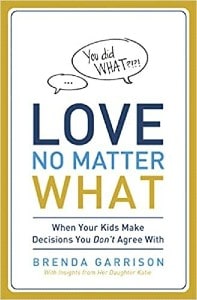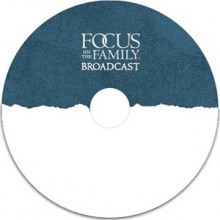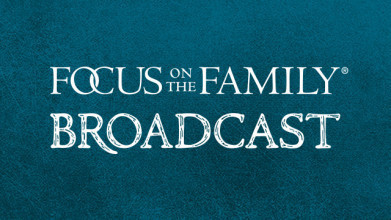Preview:
Mr. Jim Daly: Brenda, what’s one thing a mom or dad can do today to build a bridge of love to their adult child who has perhaps made a decision that they don’t agree with?
Mrs. Brenda Garrison: It’s, uh, number one thing is apologize to your child for your part ’cause you probably have a part.
Jim: Hm.
Brenda: And I think that’s gonna help them hear you faster than anything, is a heartfelt apology.
End of Preview
John Fuller: Well, Brenda Garrison is our guest on today’s Focus on the Family and she brings some great perspective today as we look at parenting your adult children. I’m John Fuller and your host is Focus president and author, Jim Daly.
Jim: Uh, John, here at Focus on the Family, we’re often talking about parenting the young child.
John: Mm-hmm.
Jim: And it’s important to build a strong foundation to equip your children, but I would say your children of all ages. I mean, you never stop parenting. And I’ve seen that and heard that from my own brothers and sisters who have adult children now. We’re still on, in that process and, but they talk about the parenting issues that they face even with their children who are 20-something, 30-something, 40-something. And that’s just the nature of parenting.
John: Mm-hmm.
Jim: It doesn’t stop when they turn 18. And we wanna talk today with someone who has a great heart for parents who are parenting those kids that maybe have made some bad choices.
John: Brenda Garrison, as I said, is our guest. And she’s a popular speaker and author of a number of books, including Love No Matter What, which shares her parenting journey with her oldest daughter named Katie. And she’s married to Gene. They have two other adult daughters as well, Kelsey and Carrie.
Jim: Uh, Brenda, let me say welcome to Focus on the Family.
Brenda: It’s great to be here. Thank you for having me.
Jim: I wanna pick up right where you opened up.
John: Mm.
Jim: And, uh, in that apology to your child.
Brenda: Mm-hmm.
Jim: Uh, something that I’ve observed, and I’d love your parenting perspective on this. The human heart seems to be made in such a way by the Creator-
Brenda: Mm-hmm.
Jim: … that when we express, uh, contriteness, when we express love to another human being, it opens the heart of that person. It’s almost… It seems to me almost impossible for that person who’s offended to resist opening up.
John: Hm.
Jim: That’s how core it is-
Brenda: Mm-hmm. Mm-hmm.
Jim: … to who we are as human beings. Uh, respond to that. Do you think that’s accurate?
Brenda: I do. I do know there are some cases, I think, where the hurt is so deep it, it’s gonna take more than one apology. It’s gonna take proof of your words, but it’s a great start, whether it be a written word or face to face would of course be best. But I really do because I think kids often think the parents think they’re always right. And we’re not always right.
Jim: (laughs)
Brenda: And we need to let our kids know that.
Jim: Yeah, and it, it, you know, there is rightness, and we as parents need to be expressing that.
Brenda: Right.
Jim: But so often I think we, as Christians, we want to adhere to the rules.
Brenda: Mm-hmm.
Jim: We want to abide by those things God told us to abide by.
Brenda: Mm-hmm.
Jim: It’s important to us and rightfully so. And then we want our children to do likewise.
Brenda: Mm-hmm.
Jim: Um, that can create great tension-
Brenda: Mm-hmm.
Jim: … because they’re on their own journey.
Brenda: Mm-hmm.
John: Mm-hmm.
Jim: They need parental boundaries-
Brenda: Right.
Jim: … don’t mishear me…
Brenda: Right.
Jim: … and that’s something Jean and I are very strong about.
Brenda: Mm-hmm.
Jim: But at the same time, at the core, the foundation, they need to know that you love them.
Brenda: Mm-hmm. Mm-hmm. Definitely. Definitely. I would say, though, unfortunately a lot of times, especially Christian parents, tend to make everything a black and white issue. And everything is not a black and white issue. God has given us a lot of space to be our own individuals, especially with Katie. She is an artist.
Jim: Now Katie’s your oldest.
Brenda: Yeah.
Jim: Okay.
Brenda: She’s our oldest. She contributed to the book. She, I handed a chapter off to her and said, “Kate, say whatever you wanna say here.”
Jim: Wow, that is brave.
Brenda: I know. I said she had to be respectful (laughing) but, and she was. But I just wanted her… And some people say it’s the best part of the book because then they can kinda get inside their kid’s head.
Jim: Yeah.
Brenda: And she shares what we did wrong, what we did right, what she was thinking in the process. And it, it was very helpful. It was a very wonderful experience for both of us to kinda have a meeting of the minds after the fact.
Jim: Uh, yeah.
Brenda: It was very healing. Yeah.
Jim: Mm. Let me ask you this. You talk about parenting as you went into it, Katie being your firstborn.
Brenda: Mm-hmm.
Jim: You thought it would be kind of a simple plan. You were raised by parents that had a pretty good plan.
Brenda: Mm-hmm.
Jim: You felt good about what you observed in your…
Brenda: Yeah.
Jim: … childhood. Um, and you thought if you could apply those values and those principles your formula would work as well. What happened?
Brenda: Oh, that’s a good question. (laughs) It didn’t work. It didn’t work. The formula… I had great parents and it worked for the five of us, but those things didn’t necessarily transfer into my family. We, we wanted the same things. We wanted to love each other, love the Lord, and all the basics, but we needed a different plan to go about achieving those same things.
Jim: What, let me ask you this-
Brenda: Mm-hmm.
Jim: … because some people… This is the crux of the issue.
Brenda: Mm-hmm.
Jim: I mean, some people are gonna defend the fact that doing the right thing, the formula, it worked in your mom and dad’s case. All five of your sib… you and your siblings.
Brenda: Mm-hmm.
Jim: You did well.
Brenda: Right.
Jim: So, they would walk away from that experience saying, “Our parenting formula worked.” What you’re saying and what we need to tease out here a bit…
Brenda: Mm-hmm.
Jim: …is you can apply that same formula with different people…
Brenda: Mm-hmm.
Jim: … and because of personality, temperament, environment, media influence… You grew up in a different era.
Brenda: Mm-hmm. Oh, my word, yes.
Jim: I mean, technology is different.
Brenda: Right.
Jim: Accessibility of our 12, 13, 14-year-olds to…
Brenda: Mm-hmm.
John: Hm.
Jim: … world data.
Brenda: Mm-hmm.
Jim: It’s just a different environment and therefore that formula may not work the same way. You gotta do it differently.
Brenda: Right.
Jim: But talk about that conflict, uh, where in one family it worked well and in another family, it doesn’t work so well.
Brenda: And even between kids in, in a family. What we did with Katie we did differently with Kelsey and differently with Carrie. And that’s why parents need to really lean into the Lord and say, “What is it with this child? What is the best way to parent this child?” And I often pray, “God help me be the mom this child needs,” because it’s gonna be different with each kid.
Jim: Now some people are gonna hear different application of principle. You’re not saying that.
Brenda: No. No.
Jim: What are you saying that’s different?
John: Hm.
Brenda: For instance, with Katie. She, like I said, she’s an artist, and that really defines her as a person, and I didn’t have a clue what that was about.
Jim: What does that mean to us that don’t know Katie?
Brenda: She…
Jim: What did that express?
Brenda: That means she likes messy. She doesn’t like black and white lines.
Jim: (laughs)
Brenda: Okay? She likes to just come and go and…
Jim: Color outside the lines?
Brenda: Oh, my word. There are no lines.
John: Hm.
Brenda: Yes, definitely. Definitely. And so, you know, we… On Saturday was cleaning day. So, we divided the house into fours…
Jim: (laughs)
Brenda: … and we all cleaned.
Jim: We do the same thing. (laughs)
Brenda: Do you really?
Jim: Yeah. (laughs)
Brenda: It’s so… And when the kids are gone, I miss it so much. Now it’s just me. But-
Jim: But there’s some fights in there, right?
Brenda: Yes, because she didn’t wanna do it exactly how I wanted. So, what I needed to do was let up on her room and let her room be her messy place. And of course, you had to get the food scraps out of there and, and all of that, but just… She could have clothes on the floor. She could have art supplies.
When she was in college in her undergrad, we went to visit her in her studio apartment, and we had moved her in. We knew what the apartment looked like. We went to visit; she knew we were coming. We got in the door and literally walked through a maze in this tiny, tiny studio apartment because it was covered with art projects, art supplies. There was no place to sit. She was beaming because this was, this was her world that she had created.
Jim: Huh.
Brenda: All of her art. It was hanging, it was sitting on the kitchen chairs, it was laying on the kitchen table, it was on the s- sofa. She was beaming. This was her world, and, in that moment, it occurred to me. I have been stepping on her oxygen. I have been stepping-
John: Hm.
Brenda: … on what makes her feel like Katie because I insisted that she fit into my mold of neat and orderly.
Jim: Uh, Brenda, let me ask you this. I love the description of that, “Stepping on the oxygen hose.”
John: Mm-hmm.
Brenda: Mm-hmm.
Jim: Um, we’ve said that in marriage broadcasts, John. But in the parenting concept, some might see that as weakness in your parenting approach that-
John: Hm.
Jim: … the lack of discipline. They see cleanliness next to Godliness.
Brenda: (laughs)
Jim: I’m amazed when you, when you hear the late-night shows from time, they show a little snippets, and they’re on… doing the street interviews and-
Brenda: Mm-hmm.
Jim: … I think one time I saw Jay Leno, maybe, and he was asking that question. “Is cleanliness next to Godliness in the Bible?” And everybody said yes. Well, it’s actually not there, is it?
Brenda: No.
Jim: There’s no scripture that says that but-
Brenda: Exactly.
Jim: But talk about how we convolute these things and create-
Brenda: Mm-hmm.
Jim: … kind of, uh, extra-curricular rules-
Brenda: Mm-hmm.
Jim: … that maybe God isn’t that concerned about.
Brenda: He’s, I don’t really think he is. The thing is we have to give our kids a place to be who they are. It’s gonna ooze out somewhere and if we can give them a space to be who they are, with a messy bedroom, say, they are gonna be way more apt to follow some other rules such as curfew, such as our rules with the internet. They need a place to say who they are. You have a place to say who you are. Why can’t we give our kids a place to be who they are? Then they’re way more willing to come back and hear what we have to say when we know we’re listening to them.
Jim: What guidelines did you apply to that? Because some things it’s right for parents to say-
Brenda: Mm-hmm.
Jim: “These are the rules and, and the parameters when it comes to electronics. You’re only gonna be able to do it-”
Brenda: Sure. Sure.
Jim: “… for so many hours a week,” or whatever.
Brenda: Mm-hmm.
Jim: Or just on the weekends, something that we do at our house. But how do you know what’s a principle and what’s expression?
Brenda: We have our core values at home. Safety, always. Especially with three girls. We want them to be safe. We want them to, to learn how to work hard. We want them to be responsible. We want them to be moral. So, we would make our decisions based on these core principles, these core values. And for every family I think it would be different on what that’s gonna look like but you know what your kids need and how much influence they can take from the outside world, how much time they need at home. We used to keep Sunday nights sacred. We don’t go anywhere, even church. It’s our time to regroup, to spend time together, maybe have a hotdog roast in the fireplace.
Jim: That’s Sunday night? Yeah.
Brenda: Sunday night. That was our time. We rebuilt family. We refreshed ourselves for the week. That was us. And so, I think parents need to be willing to say, “What is important to us and how is it gonna look-
John: Mm.
Brenda: … for our family?” And then be willing to say no to the things that don’t really matter.
Jim: Uh, Brenda, you talk in your book, Love No Matter What–
Brenda: Mm-hmm.
Jim: … you talk about your oldest being 18 coming home and kinda giving you and your husband some devastating news.
Brenda: Mm-hmm.
Jim: What was that?
Brenda: She said on the weekend, this was during the middle of the week, she said on Saturday she was moving out to an apartment. She worked part time with minimum wage. She didn’t have enough money to live. Uh, she was going to be sacrificing her college money to do so.
Jim: Hm.
Brenda: And she had a boyfriend in the shadows. We didn’t trust him to not take advantage of the situation. It’s not that we don’t want our girls to be independent. We do. She was leaving with a bad attitude, kinda throwing college to the side, just for the sake of getting out of the house because she thought she just couldn’t take it anymore.
Jim: Tell us now with Katie, what was she expressing? I mean, there are many, many parents-
John: Hm.
Brenda: Mm-hmm. Okay.
Jim: … listening that have, you know, 15 to 23-year-olds-
Brenda: Mm-hmm. Mm-hmm.
Jim: … that are, um, acting as Katie was acting.
Brenda: Mm-hmm.
Jim: Th- they’re tired of being restricted. Kind of the schedule-
John: Hm.
Brenda: Mm-hmm.
Jim: … of the expectations. They wanna break loose from it. And, John, I think it’s healthy for us to talk about this-
Brenda: Mm-hmm.
Jim: … because as I meet many of the families that support Focus on the Family-
Brenda: Mm-hmm.
Jim: … um, I would say maybe 20%, um, have had a pretty good parenting experience.
Brenda: Mm-hmm.
Jim: Their kids did well. They’re launched and they’re-
Brenda: Mm-hmm.
Jim: … healthy in every way. And that’s a great thing. I wanna give some sympathy to the other 80% that I meet-
Brenda: Mm-hmm.
Jim: … that have at least one child-
Brenda: Mm-hmm.
Jim: … that has had some difficulty. Um, and that’s what you’re expressing today. That is the reality-
Brenda: Mm-hmm.
Jim: … of probably 70, 80% of Christian homes-
Brenda: Mm-hmm.
John: Mm-hmm.
Brenda: Mm-hmm.
Jim: … where the formula has not worked.
Brenda: Mm-hmm.
Jim: Where the kids are, uh, doing things differently and it’s creating great friction in the home.
Brenda: Mm-hmm.
Jim: This is right where you’re at. Katie, your 18-year-old, is saying, “I wanna move out. I’m tired of it,” in so many ways.
Brenda: Mm-hmm.
Jim: You and your husband are dealing with it. She moves out. What’s the behavior that she then begins to express once she’s left the home? Is she now a budding flower? Has your relationship turned to roses?
Brenda: No. It took a while. (laughs) Yeah, she had some crashes and burns along the way. Uh, basically, like I said, she wanted to get out because she just didn’t like the rules. Um, she just wanted to be on her own and nothing was gonna make her happy until she was. Uh, she, yeah, she had some crash and burns. She went through a period where she didn’t go to work and we didn’t know she wasn’t going to work until her boss is like, “I don’t know where she is. I want her to be safe.” And so-
Jim: Hm.
Brenda: … we had to go over and see what was going on. She did eventually move in with the boyfriend that was lurking in the shadows which we weren’t happy about that. But sh-
Jim: Well, l mean, that is… I love the disclosure of that, but I mean that had to be a crushing blow.
Brenda: Yeah.
Jim: Again, you went, “Whoof.”
Brenda: Yeah, exactly.
Jim: Bad choices.
Brenda: And you know, we got to the point, I think Gene got there before I did, but for me-
Jim: That’s your husband, Gene.
Brenda: Yes, yes. Got to the point where, uh, nothing surprised us. We adopted this little motto that said, “It is what it is and now it’s ours to deal with.” So, we just kind of… You brace yourself when you get the phone call. She always had that tone of voice-
Jim: Mm.
Brenda: … that you knew something was coming and you just brace yourself and it’s like, “This is our reality now, and how are we going to live with it?” And grieving what we thought was going to be our future and just saying, “This is what we’re dealing with and how are we gonna have relationship with her-”
John: Mm-hmm.
Brenda: “… in the midst of the life that she’s living?” because that’s the most important thing.
Jim: Uh, Brenda, that grieving I wanna talk about-
Brenda: Okay.
Jim: … because that grieving process, people wouldn’t recognize it necessarily-
John: Mm-hmm.
Jim: … as that, but that is exactly what it is. You’re grieving the loss of an expectation that you thought would be fulfilled.
Brenda: Sure.
Jim: That can play with people in a variety of ways. How did you and Gene in your marriage manage that?
John: Mm.
Jim: Because usually there’s conflict there with the parents, between them.
Brenda: Mm-hmm. Mm-hmm.
Jim: The, the, the conflict with the child is obvious-
Brenda: Mm-hmm.
Jim: … but it’s laying in, in bed at night having this talk and it can be, “You have failed her.”
Brenda: Mm.
Jim: Or, “You have failed her.” (laughs)
Brenda: Mm-hmm.
Jim: And you begin to incriminate one another about-
Brenda: Mm-hmm.
Jim: … your lack of parenting skills or what you didn’t do. Did you and Gene have any of that?
Brenda: We didn’t, however, we, we kept the conversation going. We’ve always been like daily talkers. I mean, just always keeping up with each other daily. And we were encouraging to each other and then as God started to show me what I was doing wrong with her and how I needed to change my parenting style, because obviously it wasn’t working, um, I wasn’t relating to her, she wasn’t feeling like I cared for her, uh, as I started to open up to Gene and share, “Okay, this is what I’m thinking. This is what I’m thinking,” he’s like, “Okay.” He very graciously and gently said, “Yes, you could try this,” or “The next time you use that tone, then maybe you could use a different tone.”
John: Hm.
Brenda: And he kinda helped me along in that without being condemning.
Jim: Did you see a different relationship that Gene had with your daughter, Katie, than you had?
Brenda: Oh, my word, yes.
John: Mm.
Brenda: Oh, my word. He was so easy. I mean, just sit back in the chair and chat.
Jim: Did that make you angry?
Brenda: Angry, yes, and… because I wanted him to address things that were like stirring in me and, and again, personalities. He’s way, he’s more laid back. He’s the, more the introvert. I’m more the extrovert. Uh, I’m more, you know, Type A and it’s like, you know, we can’t be happy as a family till we deal with this. And I think too many parents take that. We can’t be happy as a family until everybody’s doing what they should do.
John: Our guest today on Focus on the Family is Brenda Garrison and she’s written a book called, Love No Matter What, and you’ll find details about that resource when you call 800-A-FAMILY or visit focusonthefamily.com/broadcast.
And let’s go ahead and hear more now from Jim Daly on Focus on the Family.
Jim: If you were to wind the clock back-
Brenda: Mm-hmm.
Jim: … uh, to you and Gene getting married, Katie’s on the way, Katie’s now 3, 4, 5.
Brenda: Mm-hmm.
Jim: 7, 8, 9, 12, 13, 14.
Brenda: Mm.
Jim: What would you have done differently?
Brenda: That’s a good question because some of what she was going through I had no clue. I tell a story in the book. When Katie is 23 and she gets together with one of her childhood friends, they’ve been friends since pre-school, and they stayed friends all through school. And the friend tells her of this story of when they were in junior high and a couple of the good Christian girls at school took her friend out to the edge of the playground past where the, uh, playground supervisors were, and told her, “Nobody likes you. You have no friends.” And the little girl was devastated. And then Katie tells her friend, “They did the same thing to me.”
Jim: Oh.
Brenda: And neither girl spoke of it to anyone. Katie didn’t tell me. Her friend didn’t tell anyone until they were 23 years old. And no wonder she would come home in a storm cloud. School was tough. And so, some of the things, you don’t as a parent, you don’t know what your kids are going through. You don’t know what they’re dealing with, and you need to show them love and understanding. Yes, they cannot come home and start kicking the dog and, and hitting the little brother. That’s not allowed. But you can give them time to go in their room and decompress. They don’t have to come right home and start talking to you. They may just need some time.
Jim: Mm.
Brenda: Katie shares often in the book, “I didn’t know what I was feeling. I didn’t know how to process what I was feeling. I was just all stirred up.” So, going back, I think I wish I would have had a clue, uh, that Katie was a different personality than mine, and then finding a mentor or an advisor with that personality to help me kinda say, “You know what? This is how your daughter’s gonna deal with this and this is where she is.”
John: Hm. I think you address this is in the book, Brenda. Did she feel that she just wasn’t safe in sharing some of these emotions with you? I mean, were you just boxing her into behaviors without really understanding her heart then?
Brenda: I think so. I, and I think, again, Katie didn’t know… I, I figure things out. When I’m feeling it, I figure it out and then I talk about it a lot. And Katie doesn’t process that way. It takes her a while to figure it out and then she doesn’t wanna talk about it a lot. And I was always thinking, “Oh, if I could just talk to her. I can ask her questions. I can pull it out of her.” And that made her want to, to withdraw even more. I needed to give her time-
John: Hm.
Brenda: … to, to process things and to come out and to talk to me instead of trying to pull it out of her and, and make everything better.
Jim: Mm.
Brenda: Because you just can’t. They come home, they’re upset, and sometimes you just can’t make it better in the first five minutes.
Jim: Uh, Brenda, uh, I would think that when you look at it, too, that there can be a lot of guilt in that process at different stages for different reasons.
Brenda: Right. Right.
John: Yes.
Jim: And maybe, you talk about your daughter, Katie, um, being told people don’t like her on the playground and she didn’t share that. I think for you perhaps as a parent, I’m just guessing-
Brenda: Mm-hmm.
Jim: … um, did you feel some guilt that you maybe didn’t even share with Gene about your relationship with Katie? I mean, did you have your own secret guilt that was going on?
Brenda: Mm. I had a lot of guilt. I, because who did she clash with more than anybody? Me. Because, like I said, Gene and, and she had a better relationship. He was more laid back than I was, and I was, yeah, she would fight with her sisters, but the major storms happened with me. So, I carried a lot of guilt into her adult years and then finally, and then I also, then every decision that she made, it was like, okay. This is because you, the mother, have cornered her into a bad decision or haven’t loved her well enough or whatever.
John: Mm-hmm.
Brenda: And finally, one day God really made it clear to me. Katie’s making this decision on her own. This is not your fault.
Jim: Right.
Brenda: And that was, that was huge for me. I still had a part to play. I still had to build a relationship with her and not give her reasons to push me away and, and to be, uh, challenged or whatever, but she was making these decisions on her own. She knew she had choices.
Jim: Brenda, it’s really important for a parent to know how to ratchet down. I think it’s very hard to do.
Brenda: Mm-hmm. Mm-hmm.
Jim: Um, obviously reading the Word, trusting in the Lord, praying for that child, are all right spiritual things to do.
Brenda: Mm-hmm.
Jim: But practically speaking then, you’re doing all that, uh, the Lord getting a hold of your tongue-
Brenda: Mm-hmm.
Jim: … and your heart.
Brenda: Mm-hmm.
Jim: Uh, talk to us for a minute about that and how over time you became better at it.
Brenda: Mm-hmm. Mm-hmm.
Jim: Because I would think for most parents, that’s the core problem, is you just speak as quickly as it comes to you without thinking about-
Brenda: Mm-hmm.
Jim: … the shame you might be giving your child.
Brenda: Mm-hmm.
John: Hm.
Jim: The message of inadequacy-
Brenda: Mm-hmm.
Jim: … that you’re giving your child. And you, in the attempt to help them be better decision makers, you’re actually loading on more obstacles-
Brenda: Mm.
Jim: … for them to be able to make those decisions-
Brenda: Mm-hmm. Mm-hmm.
Jim: … because they secretly now are walking away in their heart of hearts thinking, “Maybe mom’s right.”
Brenda: Mm-hmm.
Jim: “Maybe I’m not that good. Maybe I don’t know what I’m doing. Maybe I, I don’t have that wisdom.” So they begin that self-doubt.
Brenda: Mm-hmm.
Jim: Where did God really work on you to, um, kinda get a hold of that-
John: Mm.
Jim: … responsiveness that you had?
Brenda: Mm-hmm. Mm-hmm. First it, it goes back to the one-liner, “Without relationship you have nothing.” He showed me without relationship I have no influence. I have no voice. I’m just background noise in her life. I have to pursue relationship, first, before rules, before anything else.
John: Mm.
Brenda: And so, in the midst of that, I just let God slowly teach me. How does this sound? How, you know, is this gonna be encouraging to her? I tell a story in the book how she would come home from whichever apartment she was living in to spend the weekend and dump all of her stuff at the end of the breakfast bar, just kind of in the traffic area. I’m talking computer, art supplies, dirty laundry. Everything you can think of. And instead of making a big deal about that, I finally stopped talking about it and I just picked up her stuff and moved it because is it more important that the kitchen be neat and tidy or is it more important for me that Katie come home, feel loved, and stay longer and come home more often-
John: Mm.
Brenda: … because she feels loved? So, it’s just deciding what is important. Dirty laundry in my kitchen? Not a big deal. I know where to get rid of it very quickly. It’s more important to have that relationship and to give up the things that I thought were important. They’re not.
Jim: Mm-hmm.
John: Mm.
Brenda: There’s one thing that’s important. My daughter and her knowing God.
Jim: Mm. Uh, Brenda, we’ve talked a lot about how you and your husband, Gene, and Katie have worked out, uh, the issues.
Brenda: Mm-hmm.
Jim: Now you’re down the line. Katie’s helped you write this book, and that influence is really important because it… I think it makes the book more real.
John: Mm.
Jim: Um, but how are you doing today? How’s Katie? How’s your relationship? Where ya at?
Brenda: We’re doing great. Um, the kids were all home this past weekend, so we had… Carrie was home, our youngest, with her fiancé�. Katie was home with her fiancé�, and then Kelsey and Caleb. Kelsey, then Caleb would be her husband, were in and out. And Sunday was the last day. We had a brunch before everybody head back and Katie came up to me in the kitchen, just up to my face, and said, “Mom, I wanna thank you for everything you’ve done.” And she listed cleaning, cooking-
John: Mm.
Jim: (laughs)
Brenda: … and all that thing. And she, she’s an adult. She knows how much work it is. And so, Katie is now a grad student in Indiana pursuing her Master of Fine Arts, so she will graduate in another year. And you know, like I said, she’s now engaged. She’s doing great. She’s happy and we, best of all, we have a great relationship. The whole family does. And that’s, you know.
Jim: So, backing off and concentrating on loving Katie-
Brenda: Yes.
Jim: … worked.
Brenda: It really did. And you know, I’ve gone to stay with her in her apartment, uh, in Indiana and it’s neat as a pin. (laughs) It’s, it’s-
Jim: Really?
Brenda: Oh, yeah. She, uh, keeps it very neat. Yeah. (laughs)
Jim: Have you ever talked about the why of that? Did she, was she trying to get your goat as we say? (laughs)
Brenda: Oh, yeah. In fact, she put that little piece in the book. She said, she said she noticed when I stopped making a big deal about all the stuff she dropped at the end of the bar in the kitchen and she said, “When my mom stopped making a big deal about it, I stopped having to make a big deal about it.”
Jim: Mm.
Brenda: And so, she would just come in the house and go take her things to her room, go take the dirty laundry to the laundry room without just seeing if she could bait me by leaving stuff there.
Jim: Well, and so often and, you know, Dr. Kevin Leman has been at that very microphone-
Brenda: Mm-hmm.
Jim: … telling us when you stop making it about control, you actually begin to win.
Brenda: Yeah, exactly.
Jim: And that’s what you’re expressing there.
Brenda: Exactly, yeah.
Jim: Back off on the small stuff, concentrate on the big stuff.
Brenda: Exactly.
Jim: And that really, there’s nothing bigger than loving your child-
Brenda: Yeah. Yeah.
Jim: … no matter what. Uh, so often, I’m thinking spiritually, that the Lord has a bunch of teenagers in us.
John: (laughs)
Brenda: Oh, my word.
Jim: Isn’t it true? Think of the parenting.
Brenda: It is.
Jim: I think the Lord-
Brenda: Yeah.
Jim: … the simplicity of it is, “I’m gonna make it so obvious that I’m here.”
Brenda: Yeah. Exactly.
Jim: And there is that kinda relationship between him and us.
Brenda: Yeah.
Jim: Isn’t there?
Brenda: Oh, definitely. In fact, I have grown to better appreciate what Christ has done for me and how well He loves me through this whole experience with Katie.
Jim: Yeah.
Brenda: It’s like, “How would Jesus show her love?” Or “What, what does he have to forgive of me-
Jim: (laughs)
Brenda: … a thousand times a day?” And I try to help parents see that, you know what? You’re not so perfect either. You have plenty of issues and God’s giving you space-
John: Hm.
Brenda: … to work out your issues. And time. How many years have we been working on some of these things? And He’s giving you space to do it. Can we not do that for our kids? And so yeah. I think we just need to look at that parent/child relationship with God a little bit, as well.
Jim: Mm. I mean, this is great stuff. Brenda Garrison, your book Love No Matter What. I believe in that message. I really do. I think we can apply it, not only in our parenting-
Brenda: Thank you.
Jim: … and in our marriages-
Brenda: Yeah. Right.
John: Mm.
Jim: … but also, in the culture at large.
Brenda: Yes.
Jim: W- I, I, I think it’s exactly why Jesus said, “Love your neighbor as yourself.”
Brenda: Mm-hmm.
Jim: Because he knows the secret of our hearts and that is when we feel love and respected by people-
Brenda: Mm-hmm.
Jim: … we open up to them.
John: Mm.
Jim: We typically end up calling them our best friends.
Brenda: Mm-hmm.
Jim: And that’s what you’re expressing today. Thanks for being with us.
Brenda: It’s great to be here. Thank you both.
John: As a parent I’m sure you can relate to the journey that Brenda has been on and maybe that’s part of the path of life that God has for you. You’re bound to experience a lot of joys and some struggles along the way as a mom or a dad. And if you’re at that stage of life when your children are starting to express, maybe even exert, their independence, Brenda’s book is a terrific help. It’s called Love No Matter What: When Your Kids Make Decisions You Don’t Agree With. And this is a great resource for parents who are seeking to bridge the gap in the relationship with their children. Maybe that’s you.
Make a donation today of any amount, either a monthly pledge or a one-time gift to Focus on the Family, and we’ll say thanks for joining us in ministry by sending the book to you.
Also let me mention that we do have a team of caring Christian counselors. If you need someone to talk with, it might be that what Brenda shared has resonated with you in a really deep way, um, please know that we can set up a free phone consultation and our counselors can hear your struggles, uh, and point you towards some further help. They’ll even pray with you if you’d like.
You can make a donation, request Brenda’s book, and also get in touch with one of our counselors when you call 800, the letter A, and the word FAMILY. 800-232-6459. Or stop by focusonthefamily.com/broadcast. When you request that book from Focus on the Family, by the way, you’ll get a free audio download of the entire conversation and some additional content that we couldn’t include today.
On behalf of Jim Daly and the entire team, thanks for joining us today for Focus on the Family. I’m John Fuller inviting you back as we once again help you and your family thrive in Christ.




















